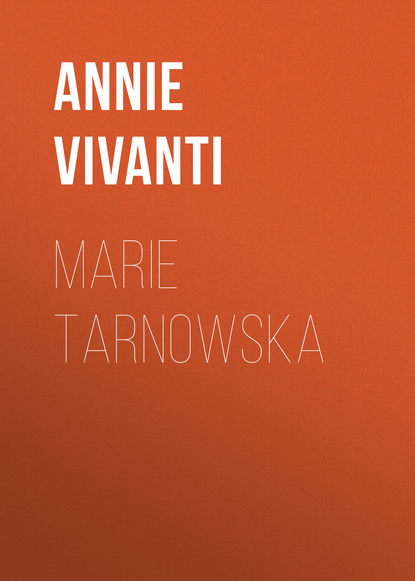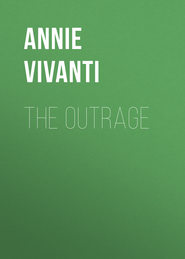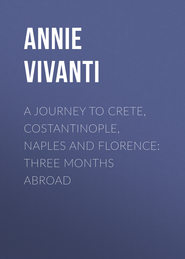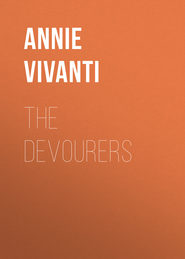По всем вопросам обращайтесь на: info@litportal.ru
(©) 2003-2024.
✖
Marie Tarnowska
Настройки чтения
Размер шрифта
Высота строк
Поля
“You are right, Elise.”
Tioka in his nightdress followed by Tania sucking the head of her favorite rubber doll have run gaily in and embrace me.
“Are we going to Switzerland?” cries Tioka, who has overheard what we were saying. “How nice! When do we start?”
“How nice! When do we start?” says Tania, who always echoes everything her brother says.
“I like to be always going away,” adds Tioka.
And Tania repeats, “I like to be always going away.”
I marvel at finding in these two children of mine, my own unrest already stirring, like a butterfly poised with quivering wings on the dawning flower of their souls.
I went down alone into the garden and entered the grove, where the sunshine only penetrates with mild rays of almost lunar whiteness. The grass under my feet was studded with periwinkles, their prim, pert faces lifted to the sky; tenuous ferns unfolded their embroidered scrolls, and masses of gentle wild violets, conscious of their pallor and their scentlessness, drooped shyly in the shade.
In the branches overhead wild hidden birds tried their new springtide voices in soft modulations and trills, or in long-drawn contralto notes of liquescent sweetness. Thus April spoke to me in gentle voices. With a sudden overwhelming longing to be nearer to the very soul of spring, I knelt on the grass and buried my face in the cool leaves and blossoms, bidding my heart be pure and cool as they.
On my homeward way I passed the targets. The servants had put everything in order—pistols, rifles and cartridges; and a fresh row of bottles seemed to await with glassy eye the shots of the amateur marksmen. With a deep sense of humiliation I remembered the feverish agitations of the previous day, and once more I said to myself: “Henceforward may my life be serene and pure.”
A gay voice rang out close behind me, and startled me from my reverie.
“Lady Marie, good morrow!” It was Bozevsky, who, clicking his spurred heels together, saluted me with a radiant smile. His morning canter seemed to have given him an added touch of beauty and of daring; his fair hair gleamed in the sunshine, his smile was reckless and resplendent.
I bowed without speaking and attempted to pursue my way to the house, but he took my hand and detained me.
“Why go in? Everybody is still asleep. Come now,” he urged, with a frank engaging smile, “stay here for awhile and practise at the targets.”
So saying he chose a rifle and loaded it. Then he held it out to me. I took it from him and put it to my shoulder. I aimed carefully and was about to press the trigger when suddenly Bozevsky, with a lightning movement, put out his hand and pressed his palm against the muzzle of my gun.
“Wait!” he cried, with a wild, extravagant laugh. “Wait a moment! Before you press the trigger I want you to say—'Alexis, I love you!'”
“You are mad!” I exclaimed. “Take away your hand!”
“No. First you must say—'Alexis, I love you.'”
I felt a hot flush rise to my brow. “Take away your hand!” I repeated and looked steadily at him.
He did not move.
“Take it away, I implore you!”
Still he never moved, and I could see that hand stopping the muzzle of my gun—a long, slender hand with fingers separate and outstretched, and I felt almost as if I were under the influence of some hallucination. It was not only his hand that I saw—I seemed in a kind of frenzy to see the hands of all men outstretched before me, ready to grasp me, to crush me, to beat me down. Doubtless a wave of madness swept over me; a convulsive spasm shook my wrist—and the gun went off. I saw the long, lithe hand drop like some wounded creature.
With a cry I let the rifle fall, and covered my face. But Bozevsky had sprung upon me, and with his other hand seized both mine and pressed them down. He was as white as death. “You little tigress,” he gasped. Then, as I was about to cry out again, he covered my mouth with his shattered hand, and I felt the blood gush over my face.
What distant heritage of madness broke upon us at that moment? What primitive frenzy lashed us together in a fierce embrace? I cannot tell. All I know is that from that hour I was his—tamed, vanquished, broken in spirit, and yet glad. He was the first, the last, the only lover of my devastated youth, and by his side the brief springtime of my happiness flowered and died. When the fearful death that was so soon to lay him low came upon him, when I saw him fall at my feet shot by Vassili—my reason gave way. The rest of my life lies behind me like a somber nightmare landscape, through which I wander, groping in the dark, stumbling forward on my way to perdition....
Yet sometimes I dream that it is all not true, that he still lives, that one day the door of my cell will open, and the lover of my youth appear to me again. I shall see him standing on the threshold, a halo of sunshine lighting his fair hair, like some young martyr-saint come to deliver me from my bondage. The hand I wounded will be filled with roses, and his clear voice will call me by my name.
Then rising from this gloomy prison bench I shall move to meet him. Shame and crime and captivity will fall away from me like a dark and worn-out cloak.
Free and fair as in those distant April days in which he loved me, with white, winged footsteps I shall follow him.
XIV
Suddenly, almost from one day to another, Vassili grew jealous. When I had adored him he had neglected and forsaken me. Now that he feared to lose me he was inconsolable.
“You and Tioka are very much alike,” I said to him one day when we were all at luncheon.
“Do you think so?” said Vassili, patting his little son's fair head and contemplating the small face, which at that moment was making a terrible grimace over its food. “What makes you say so?”
“You shall see.” I leaned over to the child. “Tioka, my darling, won't you eat your nice dinner?”
“No!” said Tioka with great decision.
“Come, now, darling, eat your nice soup,” and I held a spoonful to his lips.
“No,” said Tioka, turning his face away.
“Why not, dear? Don't you like it?”
“No. It's nasty.”
“Well, then,” I said, putting down the spoon, “we will give it to the farmer's little boy.”
“No! no!” cried Tioka, and he quickly devoured the soup in large spoonfuls.
Vassili laughed. “He is quite right. His soup is not for the farmer's little boy. To each one his own soup, isn't that so, Tioka!”
“No,” said Tioka.
“Why 'no'? You should say 'yes.'”
“No,” declared Tioka doggedly. “This is my 'no' day.”
“Your what?” exclaimed his father.
“My day for saying 'no,'” announced Tioka with great decision.
His father was much amused. “I also shall have my 'no' days,” he declared. “And I shall begin at once. To-day, Mura, we shall receive no visitors.”
“But, Vassili,” I protested, “we must see the Grigorievskys; we have invited them to dinner.”
“No,” said my husband.
“And Semenzoff. And Bozevsky.”
“No,” he repeated.
Tioka in his nightdress followed by Tania sucking the head of her favorite rubber doll have run gaily in and embrace me.
“Are we going to Switzerland?” cries Tioka, who has overheard what we were saying. “How nice! When do we start?”
“How nice! When do we start?” says Tania, who always echoes everything her brother says.
“I like to be always going away,” adds Tioka.
And Tania repeats, “I like to be always going away.”
I marvel at finding in these two children of mine, my own unrest already stirring, like a butterfly poised with quivering wings on the dawning flower of their souls.
I went down alone into the garden and entered the grove, where the sunshine only penetrates with mild rays of almost lunar whiteness. The grass under my feet was studded with periwinkles, their prim, pert faces lifted to the sky; tenuous ferns unfolded their embroidered scrolls, and masses of gentle wild violets, conscious of their pallor and their scentlessness, drooped shyly in the shade.
In the branches overhead wild hidden birds tried their new springtide voices in soft modulations and trills, or in long-drawn contralto notes of liquescent sweetness. Thus April spoke to me in gentle voices. With a sudden overwhelming longing to be nearer to the very soul of spring, I knelt on the grass and buried my face in the cool leaves and blossoms, bidding my heart be pure and cool as they.
On my homeward way I passed the targets. The servants had put everything in order—pistols, rifles and cartridges; and a fresh row of bottles seemed to await with glassy eye the shots of the amateur marksmen. With a deep sense of humiliation I remembered the feverish agitations of the previous day, and once more I said to myself: “Henceforward may my life be serene and pure.”
A gay voice rang out close behind me, and startled me from my reverie.
“Lady Marie, good morrow!” It was Bozevsky, who, clicking his spurred heels together, saluted me with a radiant smile. His morning canter seemed to have given him an added touch of beauty and of daring; his fair hair gleamed in the sunshine, his smile was reckless and resplendent.
I bowed without speaking and attempted to pursue my way to the house, but he took my hand and detained me.
“Why go in? Everybody is still asleep. Come now,” he urged, with a frank engaging smile, “stay here for awhile and practise at the targets.”
So saying he chose a rifle and loaded it. Then he held it out to me. I took it from him and put it to my shoulder. I aimed carefully and was about to press the trigger when suddenly Bozevsky, with a lightning movement, put out his hand and pressed his palm against the muzzle of my gun.
“Wait!” he cried, with a wild, extravagant laugh. “Wait a moment! Before you press the trigger I want you to say—'Alexis, I love you!'”
“You are mad!” I exclaimed. “Take away your hand!”
“No. First you must say—'Alexis, I love you.'”
I felt a hot flush rise to my brow. “Take away your hand!” I repeated and looked steadily at him.
He did not move.
“Take it away, I implore you!”
Still he never moved, and I could see that hand stopping the muzzle of my gun—a long, slender hand with fingers separate and outstretched, and I felt almost as if I were under the influence of some hallucination. It was not only his hand that I saw—I seemed in a kind of frenzy to see the hands of all men outstretched before me, ready to grasp me, to crush me, to beat me down. Doubtless a wave of madness swept over me; a convulsive spasm shook my wrist—and the gun went off. I saw the long, lithe hand drop like some wounded creature.
With a cry I let the rifle fall, and covered my face. But Bozevsky had sprung upon me, and with his other hand seized both mine and pressed them down. He was as white as death. “You little tigress,” he gasped. Then, as I was about to cry out again, he covered my mouth with his shattered hand, and I felt the blood gush over my face.
What distant heritage of madness broke upon us at that moment? What primitive frenzy lashed us together in a fierce embrace? I cannot tell. All I know is that from that hour I was his—tamed, vanquished, broken in spirit, and yet glad. He was the first, the last, the only lover of my devastated youth, and by his side the brief springtime of my happiness flowered and died. When the fearful death that was so soon to lay him low came upon him, when I saw him fall at my feet shot by Vassili—my reason gave way. The rest of my life lies behind me like a somber nightmare landscape, through which I wander, groping in the dark, stumbling forward on my way to perdition....
Yet sometimes I dream that it is all not true, that he still lives, that one day the door of my cell will open, and the lover of my youth appear to me again. I shall see him standing on the threshold, a halo of sunshine lighting his fair hair, like some young martyr-saint come to deliver me from my bondage. The hand I wounded will be filled with roses, and his clear voice will call me by my name.
Then rising from this gloomy prison bench I shall move to meet him. Shame and crime and captivity will fall away from me like a dark and worn-out cloak.
Free and fair as in those distant April days in which he loved me, with white, winged footsteps I shall follow him.
XIV
Suddenly, almost from one day to another, Vassili grew jealous. When I had adored him he had neglected and forsaken me. Now that he feared to lose me he was inconsolable.
“You and Tioka are very much alike,” I said to him one day when we were all at luncheon.
“Do you think so?” said Vassili, patting his little son's fair head and contemplating the small face, which at that moment was making a terrible grimace over its food. “What makes you say so?”
“You shall see.” I leaned over to the child. “Tioka, my darling, won't you eat your nice dinner?”
“No!” said Tioka with great decision.
“Come, now, darling, eat your nice soup,” and I held a spoonful to his lips.
“No,” said Tioka, turning his face away.
“Why not, dear? Don't you like it?”
“No. It's nasty.”
“Well, then,” I said, putting down the spoon, “we will give it to the farmer's little boy.”
“No! no!” cried Tioka, and he quickly devoured the soup in large spoonfuls.
Vassili laughed. “He is quite right. His soup is not for the farmer's little boy. To each one his own soup, isn't that so, Tioka!”
“No,” said Tioka.
“Why 'no'? You should say 'yes.'”
“No,” declared Tioka doggedly. “This is my 'no' day.”
“Your what?” exclaimed his father.
“My day for saying 'no,'” announced Tioka with great decision.
His father was much amused. “I also shall have my 'no' days,” he declared. “And I shall begin at once. To-day, Mura, we shall receive no visitors.”
“But, Vassili,” I protested, “we must see the Grigorievskys; we have invited them to dinner.”
“No,” said my husband.
“And Semenzoff. And Bozevsky.”
“No,” he repeated.








